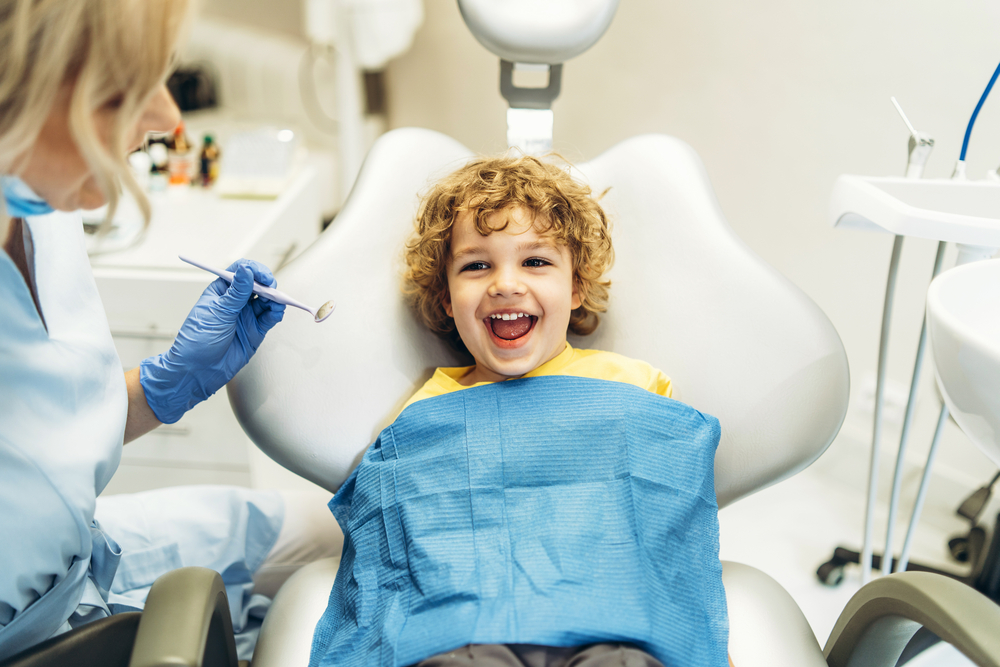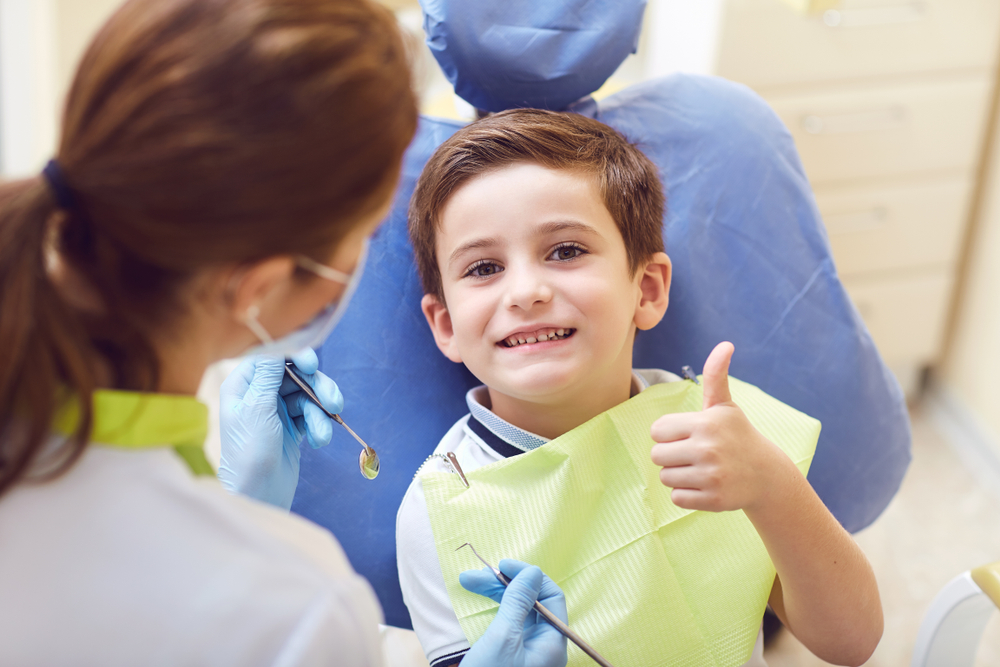Your child’s first dental visit is an important milestone, filled with a lot of anticipation, questions, and for some, anxiety.
Do you know what to expect? And how can you best prepare for it?
Rest assured that with the right preparation, help from the dentist, and a little know-how, your child’s first visit can be an enjoyable experience.
Our pediatric dentists from Oxford Dental are here to help you prepare for your child’s first dental visit and set the stage for them to look forward to future dental visits with us.
Let’s get started!
When Should A Child Visit the Dentist for the First Time?
According to the American Academy of Pediatric Dentistry, a child’s first dental visit should happen by their first birthday or within six months of their first tooth.
This first dental appointment allows the dentist to check for any potential problems with your child’s oral health and to educate you on proper dental care for your child.
Early visits to a pediatric dentist can help prevent future dental problems, catch issues in the early stages, and address habits such as thumb sucking and pacifier use.
Ultimately, early dental visits can help prevent dental anxiety in children by making the whole experience familiar and less scary.
It’s important to establish good dental habits early on in life to ensure a lifetime of healthy teeth and gums!
What to Expect On Your Child’s First Dental Visit
During your child’s first dental visit, the dentist will focus on building a relationship with your child to establish trust and help them feel comfortable in the dental office.
They will also discuss your child’s medical history and dental history as well as proper oral hygiene practices, teething, and other common oral health issues in infants and young children.
The dentist will also take a look at your child’s teeth, gums, and mouth to assess any risks of developing tooth decay or the need for orthodontic treatment.
At the end of the visit, the dentist will work with you to develop a plan for regular dental checkups and cleanings.
If there is plaque on your child’s teeth, the dentist may clean it away with a soft toothbrush.
And if your child is comfortable enough, they may receive a fluoride treatment. Flouride is a mineral that helps prevent tooth decay and strengthens the enamel of your child’s teeth.
It’s applied to the teeth as a gel or foam, which is then rinsed off with water.
But if your child is anxious during their first dental appointment, the dentist will wait until your child is more comfortable during the next visit to do a fluoride treatment.
How to Prepare for Your Child’s First Dental Appointment

Preparing for your child’s first dental appointment can help ensure a positive experience for both you and your child!
The goal of your child’s first dental visit is to establish a positive relationship between your child and the dentist and to provide you with information on how to properly care for your child’s oral health.
By taking a few simple steps to prepare, you can help ensure that your child’s first dental appointment is a success:
Create a Healthy Dental Routine
An important part of preparing for the first dental appointment is creating a routine. The more your child does something, the easier it becomes.
The more they practice, the more comfortable they will feel, and the more comfortable they feel, the easier it will be to get your child to cooperate with their teeth cleaning and checkups!
This is why we recommend starting with brushing twice daily when your child grows their first tooth.
The earlier in life that kids start using toothbrushes and floss, the better chance they have at developing healthy habits that last into adulthood.
Schedule a Morning Appointment
It’s best to schedule an appointment when your child is well-rested and alert, which is typically in the morning.
At Oxford Dental, we offer Saturday appointments beginning at 8 am – so even if you have a busy schedule during the week, you can still bring your little one in for a morning appointment!
Explain What Will Happen
Talk to your child about the upcoming dental appointment in a positive and reassuring manner. Avoid using words that may cause anxiety or fear, such as “hurt” or “needle.”
Explain to your child what the dentist will do, which is look in their mouth and touch their teeth with harmless tools.
You can help prepare their child by showing them kid-friendly videos of dental visits or using stuffed animals and toys to act out a dental visit.
Establish a Reward
While most kids are excited to dig through a dentist’s treasure box of toys at the end of their visit, some may need more encouragement.
Before you take your little one to their first dental appointment, come up with a fun and exciting reward they can enjoy after the visit.
This could be something simple like a trip to the playground or a special treat on the way home.
Just make sure they know about this reward beforehand!
Make Your Child Comfortable
Visiting a dental office for the first time can be scary for a child, so do what you can to make them comfortable during this time.
You can have them bring along a favorite toy or comfort item to help your child feel more at ease.
Our team loves meeting the stuffies that come to our office!
Special Needs
If your child has any special needs, let the dental office know ahead of time so they can make any necessary accommodations.
The same goes for children with fears and anxieties about the dental visit. Ask the dentist or dental staff if they can give your child a tour of the office before the appointment to help your child feel familiar with the surroundings.
Pediatric Dentistry at Oxford Dental
Dental health can have a significant impact on your child’s oral health.
Thankfully recent research has shown that the development of early oral hygiene behaviors is strongly associated with the prevention of dental decay.
With these results in mind, parents are now encouraged to begin simple preventive measures for their children as soon as the first tooth appears.
At Oxford Dental, we have the expertise and knowledge to care for your child’s teeth, gums, and mouth throughout every stage of their development.

